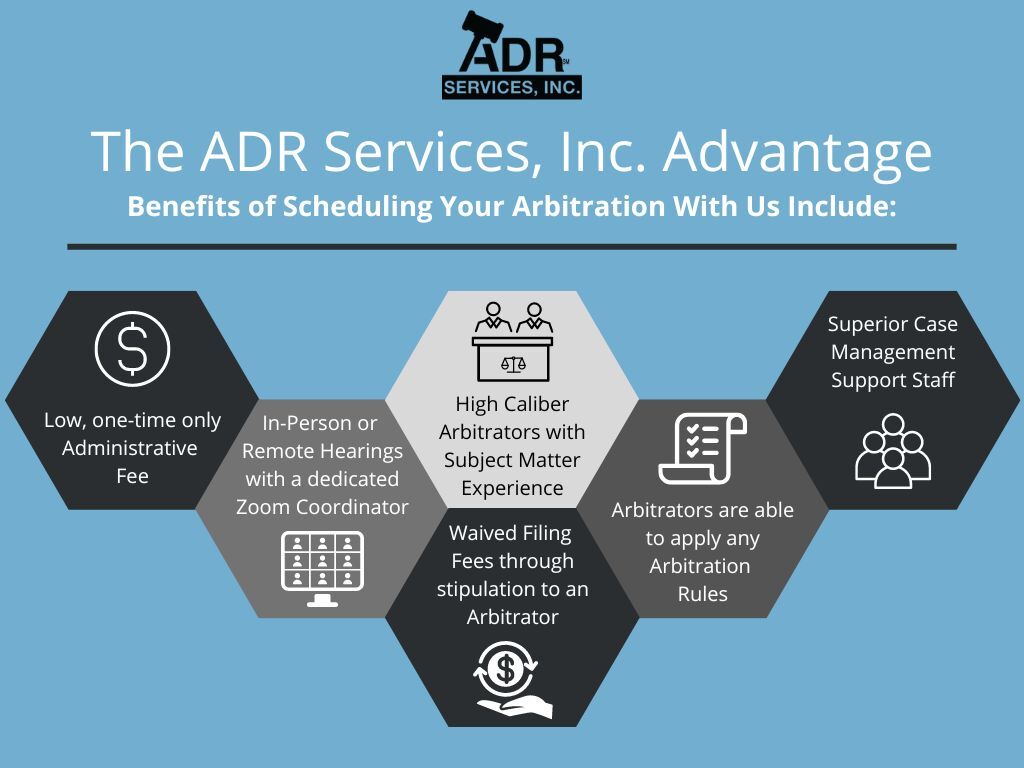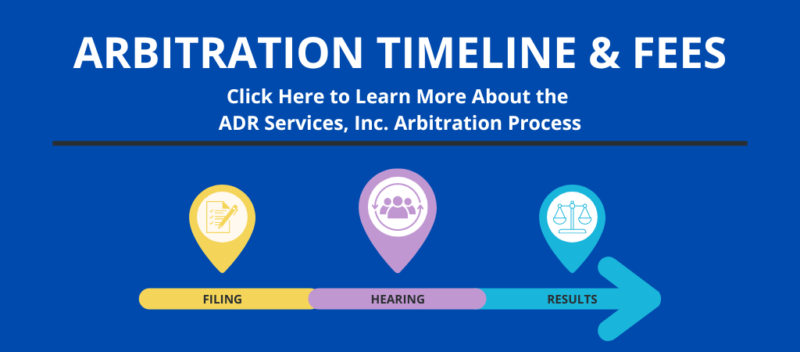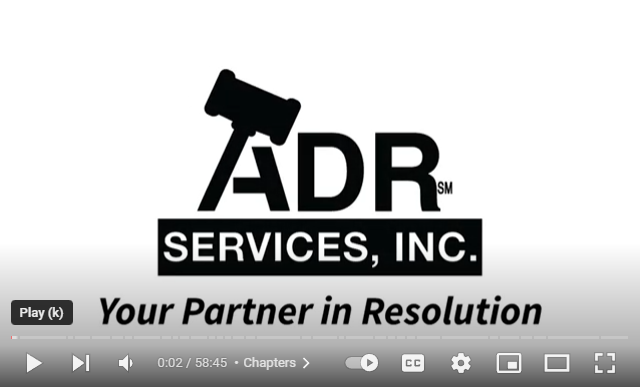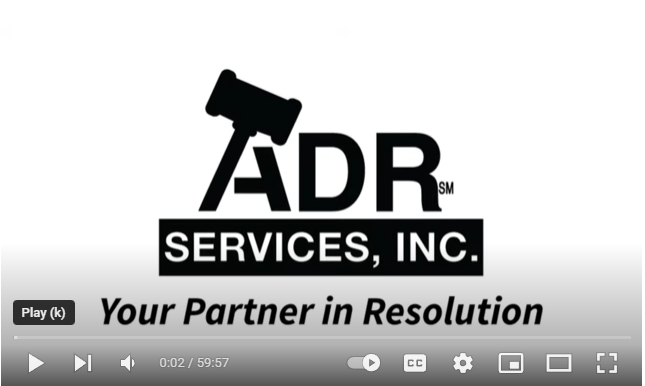As an Administrator, ADR Services, Inc.’s role is to manage the administrative aspects of the arbitration, such as facilitating the appointment of an arbitrator, scheduling of hearings and handling the fees associated with the arbitration. ADR Services, Inc. does not decide the merits of a case or make substantive rulings on any of the issues presented. Because the Administrator’s role is solely administrative, ADR Services, Inc. has no power or jurisdiction to reconsider, overrule or change an arbitrator’s decisions or rulings.

The ADR Services, Inc. Arbitration Process is streamlined and straightforward. Click on the image below to learn more about our general timeline and fees associated with each step along the way.
What are the Advantages of Arbitration over Trial?
- More Cost Efficient: Arbitration allows the opportunity to streamline the processes and minimize costs to the parties.
- Flexible Scheduling & Process: Arbitration proceedings can be scheduled around the needs and availabilities of the parties and is typically faster than the more cumbersome court process.
- Simplified rules of evidence and procedure. ADR Services Inc. has its own set of Arbitration Rules, or counsel can stipulate to apply any other Arbitration Rules.
- Direct Arbitrator Selection: Select an Arbitrator with the requisite amount of experience and subject matter expertise to render an accurate and appropriate award.
- Limited Grounds for Judicial Review: This effectuates the parties’ agreement that the award be binding.
Types of Arbitration
Consumer Arbitration
Consumer arbitration involves disputes between consumers (customers, clients or patrons) and businesses. Most consumer arbitrations occur pursuant to a pre-dispute arbitration clause agreed upon by the consumer as a condition of obtaining the service or product from the business.
“Consumer arbitration” is defined in the California Rules of Court Ethics Standards, Standard 2(d) as an “arbitration conducted under a predispute arbitration provision contained in a contract that meets the” following criteria:
- a contract with a “consumer party,” who is defined as:
1. an individual seeking or acquiring goods or services for personal/family/household purposes, including by lease; or
2. an enrollee/subscriber/insured in a healthcare insurance plan; or
3. a person with a medical malpractice claim; or
4. an employee or applicant for prospective employment - The contract was drafted by or on behalf of the nonconsumer party; and
- The consumer party was required to accept the arbitration provision in the contract.
Non-Consumer Arbitration
An arbitration that does not satisfy the criteria for being a consumer arbitration. These cases typically involve business disputes and other claims where the parties to the arbitration agreement had the right to negotiate the agreement terms.
Kaiser Panel
The Office of Independent Administrator (“OIA”), which administers Kaiser arbitrations, sets forth specific parameters in its Rule 14 regarding the Number of Arbitrators to hear the matter depending on whether the total damages sought are less than or exceed $200,000. Arbitrations involving damages less than $200,000 are conducted by a single arbitrator. A panel of three arbitrators is set forth for cases involving more than $200,000, unless both sides agree to proceed with a single arbitrator. Please refer to the Rules for Kaiser Permanente Member Arbitrations, Rule 14, for additional important information in this regard.
UM/UIM
The Uninsured Motorist Act requires every automobile liability insurance policy issued in California to include coverage designed to compensate insureds (or their heirs or legal representatives) for bodily injury or wrongful death inflicted by the owner or operator of an “uninsured vehicle.” This includes uninsured and underinsured coverage. If not expressly provided in the insurance policy itself, minimum coverage will be deemed included by law. (Insurance Code § 11580.2(a).) The form in which UM/UIM arbitrations are held is dictated by the applicable insurance policy, subject to applicable Code provisions. The measure of damages is the amount the insured is legally entitled to recover from the uninsured motorist, subject to the limits of liability under the uninsured motorist coverage available (including “anti-stacking” rule) and any applicable set-offs. Underinsured motorist coverage is triggered only if the tortfeasor’s (other driver’s) policy limits are less than claimant’s policy limits. (Insurance Code § 11580.2(p)(2)) Thus, claimants are not entitled to underinsured motorist policy benefits where the tortfeasor has the same or higher policy limits.
Tribunal
Panels of one or more arbitrators responsible for adjudicating disputes between the parties. Disputes in arbitration can be resolved by a single neutral arbitrator or a panel of three arbitrators. The panel can consist of neutral or non-neutral party arbitrators and a chairperson or umpire arbitrator. The method of appointment of the tribunal is generally found in the legal instruments that contain the parties’ arbitration clause or in the applicable provider rules.
Appraisals
Under California law, agreements providing for “valuations, appraisals and similar proceedings” are treated as agreements to arbitrate. For example, the standard form fire insurance policy requires that any dispute between the insured and insurer regarding the amount of loss be resolved by an “appraisal process” (each party selects its own “competent and disinterested” appraiser; together, the appraisers select a “competent and disinterested umpire” to resolve disagreements between the appraisers). (Insurance Code §2071.)
Mock Arbitrations
A mock arbitration is a simulated hearing before a single or multiple member panel conducted pursuant to the same rules and regulations as an actual arbitration hearing. It is designed as a predictive exercise to assist counsel to test the evidence and theories of the case, develop the most persuasive argument and improve the overall presentation. Where appropriate, it can also be a means for familiarizing witnesses with the hearing process and preparing counsel for cross-examination through the use of mock adverse witnesses. The mock arbitration will be tailored to suit your needs, whether thorough and lengthy or succinct and focused. The mock arbitrator(s) will be kept unaware of which side is making the presentation until its conclusion, at which time you will be provided with oral and/or written feedback on the briefs, oral arguments, case presentations, witnesses and exhibits presented. Like mock jury trials in advance of litigation, a mock arbitration is unrivaled by any other method of preparation for arbitration.
Mass Arbitration
Mass Arbitration and ADR Services, Inc.’s Mass Arbitration Fee Schedules for employment and other consumer matters shall apply when twenty (20)* or more arbitration claims are filed which: (1) involve the same or similar parties; (2) are based on the same or similar claims which arise from the same or substantially identical transactions, incidents, or events requiring the determination of the same or substantially identical questions of law or fact; and (3) involve the same or coordinated counsel for the parties. (*Or as otherwise defined in the parties’ arbitration agreement.)
Non-Binding Arbitration
In non-binding arbitration, the arbitrator(s) make a determination of the rights of the parties to the dispute, but the determination is not final or legally binding upon them. No court-enforceable arbitration award is issued. Subsequent to a non-binding arbitration, the parties remain free to pursue their claims either through the courts, or by way of a binding arbitration, although in practice a settlement is the most common outcome. The award and reasoning in a non-binding arbitration is almost invariably inadmissible in any subsequent action in the courts or in another arbitration tribunal.
Arbitration Rules
ADR Services, Inc. offers rules, procedures and guidelines designed to address the needs of the parties, as well as to promote clear and shared expectations regarding the process.
The parties shall be deemed to have made these rules a part of their arbitration agreement whenever their arbitration contract provides for arbitration according to the ADR Services, Inc. Rules, or whenever the parties have otherwise agreed to the applicability of these rules. Counsel can also stipulate that ADR Services, Inc. Arbitrators apply any other Arbitration Rules.
Access the ADR Services, Inc. Arbitration Rules Here
*The Rules which shall apply to your arbitration will be those in effect at the time the demand for arbitration, stipulation or court order is received by ADR Services, Inc.
How are Disputes Submitted to Arbitration?
There are three ways to commence an arbitration with ADR Services: By Demand; By Stipulation; and By Court Order.
1) By Demand:
An arbitration may be commenced by submitting the “Demand for Arbitration” form. A demand occurs when a party to a contract with an arbitration clause that names ADR Services, Inc. or these rules serves a written Demand for Arbitration concurrently on ADR Services and the opposing party(ies). You may file a Demand for Arbitration here.
2) By Stipulation:
An arbitration may be jointly commenced via submission (stipulation) in the following manner:
- The submission to ADR Services, Inc. of a post-dispute arbitration agreement fully executed by all parties that specifies ADR Services, Inc. administration or use of any ADR Services, Inc. rules; or
- The oral agreement of all parties to participate in an arbitration administered by ADR Services, Inc. or conducted pursuant to any ADR Services, Inc. rules, confirmed in writing by all parties; or
- By filing at any office of ADR Services, Inc. a copy of a written submission to arbitrate under these rules, signed by all parties. It shall contain a statement of the nature of the dispute, the names and addresses of all parties, any claims and counterclaims, the amount involved, if any, the remedy sought, and the hearing locale requested. Unless the parties state otherwise in the submission, all claims and counterclaims will be deemed to be denied by the other party.
3) By Court Order:
An arbitration may also be commenced via submission of a Court Order compelling arbitration, which shall be submitted to ADR Services, Inc. together with a copy of the parties’ arbitration agreement as well as any Complaint, Answer, Cross-Complaint or other pleading filed with the Court, which shall be presumed to be the operative pleadings for the arbitration unless otherwise specified by the parties.
See ADR Services, Inc. Arbitration Rule 5 for further information on the above options.
Self-Study MCLE Credit
Earn Self-Study MCLE Credit and learn more about the arbitration process by watching these complimentary programs presented by ADR Services, Inc. Neutrals.
Winning While Saving on Costs with Arbitrations and Court References
Due to the impact of the Covid-19 pandemic, courts are backlogged at levels never seen before. Arbitrations and court references, often avoided in the past because of concerns about cost and fundamental fairness, present alternatives that should be reexamined. This presentation will examine the advantages and disadvantages of each alternative, including how to select an arbitrator or temporary judge (referee); preservation of appellate rights; and, perhaps most importantly, how to keep costs down.
Surviving Arbitration
Three veteran LA Superior Court Judges, now battle-tested arbitrators, will weigh in on various issues regarding Arbitrations via Zoom, In-Person Arbitrations, and Arbitrations with both an in-person and virtual component. These esteemed ADR Services, Inc.’s neutrals will share their thoughts, perspectives, problems, and some solutions to help you survive the rigors of putting on your case in this Covid-19 environment.
If you would like an overview of our online case management system, AMS, please send an email to demands@adrservices.com









